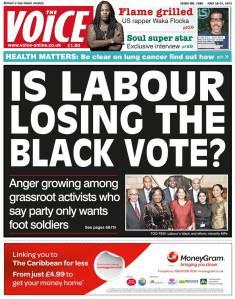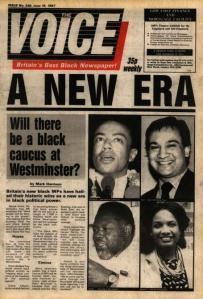 The Voice newspaper front page this week asks “Is Labour Losing the Black Vote?” The answer they suggest is ‘yes’ but it’s not quite that simple. Here are my questions (and answers):
The Voice newspaper front page this week asks “Is Labour Losing the Black Vote?” The answer they suggest is ‘yes’ but it’s not quite that simple. Here are my questions (and answers):
Is there a ‘Black Vote’?
In the sense that Black (African, Caribbean and Asian) are much more likely to vote Labour than the White electorate, yes. The Runnymede Trust estimate that 68 percent of BAME voters gave their ‘x’ to Labour in 2010 as opposed to just 31 percent of White voters. This is broadly in line with previous studies. Labour support is highest among Africans followed by Caribbean’s and Bangladeshi’s. In addition to being concerned about the bread-and-butter political issues of the day, BAME voters are generally attracted to policies that address unequal and disproportionate racial outcomes, they want to see BAME political representation and are repelled by parties and candidates that send out hostile messages. As a study by Lord Ashcroft noted, the Conservatives have still not recovered from the legacy of Enoch Powell and decades of being the ‘nasty party’ which partially explains why only ten percent of BAME voters identified with the Tories in 2010.
Is Labour losing it?
Yes, but that’s nothing new. Labour’s grip on the Black vote, once over 90 percent, has been declining with every passing election. This is inevitable, as British-born generations of immigrants increasingly make choices according to their views and place on the political spectrum rather than the voting habits of their parents and grandparents. Black unemployment may have rocketed in this recession but the record numbers of BAME university applicants is to an extent an expression of the desire to be part of the successful professional classes. Whether Labour are ‘losing’ the Black vote or whether it is naturally diversifying is a moot point.

No. ‘Race’ has been off the political agenda for a long time and there is little evidence that the increase in BAME Conservative MPs has attracted many BAME votes even though it may have helped soften their ‘nasty’ image across the whole electorate. The Lib Dems, without any MPs of color and hardly any race-specific policies, managed to increase their share of the Black vote to 14 percent in 2010 against a background of ‘Cleggmania’ and weariness of 13 years of Labour rule.
If Labour are losing the Black vote but other parties aren’t winning it, where’s it going?
Not to UKIP! What we are seeing is a trend of floating voters mostly sympathetic to Labour but going out ‘on loan’ from one election to the next influenced by the national mood but also a wish to see a combination of progressive policies, support for entrepreneurship and an awareness of the particular challenges and struggles BAME citizens face. The Runnymede survey found 20 percent of BAME voters don’t identify with any party but even those that do are likely to make informed choices on a range of issues. Last time around the Liberal Democrats benefited however in 2015 it is likely many will gravitate back to Labour. The extent will be determined by how successful Ed Miliband is at unveiling policies and messages to win the Black vote, and that in turn could prove decisive in the general election.
So Labour are winning the Black vote?
No, much of the frustration expressed in The Voice stems from the vacuum caused by an absence of policies and a growing sense that they are persisting with a colourblind approach that takes BAME voters for granted. There will be a swing back to Labour in 2015 but, as I have argued, this may not be significant unless Labour pull their finger out. Even then, it will take more, much more, to bring the Black vote permanently back into the fold. Chances are it will slide away again, perhaps in even greater numbers, in subsequent elections unless Labour can rise to the challenge.
What do they need to do then?
Break free from accepted wisdoms in the Westminster bubble. The assumption that Labour’s inner city safe seats will remain safe is a risky strategy given the trend to vote for other parties especially when considered alongside projections of an inexorable rise in the BAME population into the future. The disregard for the power of the Black vote in marginal constituencies is even more foolhardy. This mindset largely flows from a belief that explicitly courting the Black vote will put off White floating voters. It is an assumption that is behind the times; the general population are increasingly accepting of the need for all parties to target messaging to sections of the electorate and in Britain’s multicultural society any negative reaction will lessen considerably over time, especially when voters get used to it. Labour strategiests need to get in front of the curve not trail behind it and that requires a dose of bravery but it is bravery that could be richly rewarded in the future.
Does that go for other parties too?
Even more so. I have long argued that the Liberal Democrats are, in theory, ideally positioned to attract BAME voters. The philosophical beliefs in equality, freedom, democracy and enterprise put the Lib Dems in prime position to appeal to many strands of the Black vote as well as more Conservative-inclined voters, such as African and Caribbean churchgoers, who continue to feel uncomfortable with the Tories and would prefer an alternative. However the failure of the Lib Dems to capitalise on this, or even get off first base, could set the party back regarding the Black vote for a long time.
Why is this happening?
For similar reasons why Labour are struggling. A largely undiverse professional class of political advisors and MPs who have grown up in the Westminster village whose deep mistrust of the ‘Black agenda’ blinds them to seeing the benefits of it. They live in hope that the BAME electorate is so ‘mainstreamed’ that they don’t have to bother with addressing specific interests; they ask people who don’t know and won’t speak to those who do, preferring to write them off as radicals; and proffer their patronage only to those who make them feel comfortable those who do not challenging them or their assumptions.
What can be done about this?
Some ‘radicals’, which I guess includes yours truly, would argue what is needed is self-organisation, making demands, writing policies within our own circles and assisting the right candidates get selected. However that is only part of the answer. The political ‘system’ has to also experience its’ own Damascus moment as I believe America did last year when Mitt Romney’s Republicans ran out of Black voters and found that changing demographics meant they couldn’t win without them. The US has many different dynamics to Britain but we may end up in the same place. A growing realisation that the British Black vote is all to play for and is essential to getting the keys to Downing Street will eventually change perceptions.
When will this happen?
More slowly than would be the case if Britain had a different political system like proportional representation. There needs to be more than a change in perceptions, what is needed is a change in political culture; a recognition that parties really do need to be in touch with experience at the grassroots, more alive to issues and tensions and more willing to take action to address them regardless of whatever happens to be the ‘news agenda’ of the moment. What is required is new thinking. Too many of the current generation reject ‘tokenism’, as we all do but fail to realize that the rejection of tokenism must be replaced with substantial policies that will make a real difference to making Britain more equal racially. Westminster needs to grasp the scale of the challenge, the extent of racial disadvantage, and need the energy and commitment to search for solutions and the political will to drive them through.
Can this generation of politicians do it?
It’s possible. But what will accelerate progress is an opening up of the political system to people with real experience of life in Black communities. How is a matter of debate, but I would suggest primaries for selecting candidates, enabling all-Black shortlists, allowing members to hold popularity elections for frontbenchers and allow them to elect key officials, publishing tables on the proportion of politicians by professional backgrounds, and of course PR. But more than that, parties need to outwardly talent-search rather than select from a limited gene-pool. We must level the playing field to allow people of all backgrounds to get involved with clear career progression, mentoring and support for everyone not just the privileged that unofficially benefit from sponsorship, encouragement and advice curtsey of connections.
Doesn’t it still depend on where these new people come from?
It does. There’s a wealth of untapped talent out there but if parties only look in ‘professional’ circles they will miss the talent at the grassroots; community organisers, those working in voluntary projects, youth clubs or in community radio, not to forget the churches, mosques and gurdwara’s. Politics needs to recognize that people don’t just bring their talents to the table but also their culture, history, perspectives and often their faith. The preference for fully assimilated politicians of color is just a variation on the self-replication tendencies that have kept Westminster so White in the past. Politics can benefit enormously from those with genuine connections and popularity within BAME communities, not least because floating voters will more likely vote for candidates who are known before their life in politics.
Which brings us back to the beginning…
Exactly! Increasingly BAME voters are looking for a party that will reach out and speak to them. It isn’t so much a case of Labour losing the Black vote and more of it being up for grabs. Failure to play for it will only increase the proportion of the disenfrancised who don’t vote at all, and that is bad for democracy as a whole. They are looking for all parties to change, not with token initiatives but change in mind, body and spirit.
By Lester Holloway @brolezholloway
